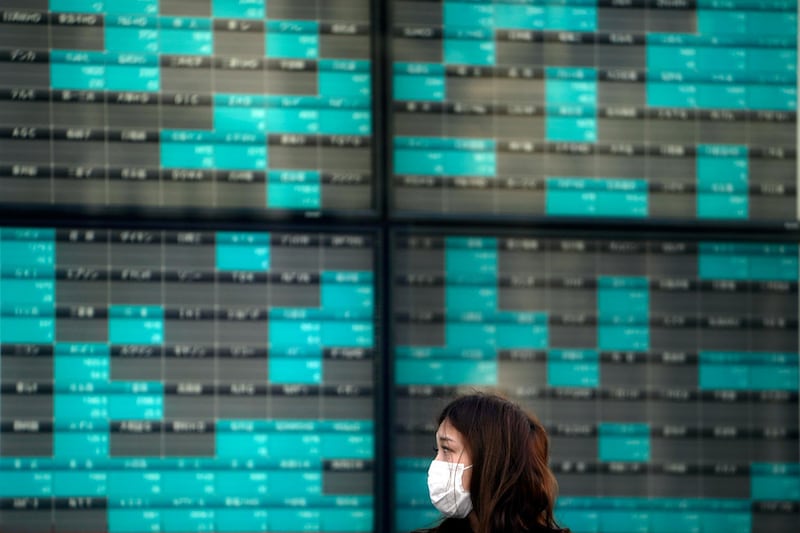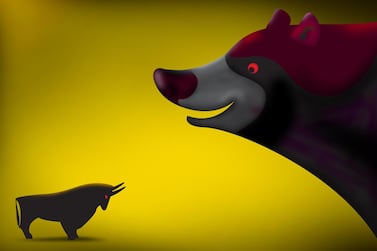Even before trading opened on Monday, the US Federal Reserve tried to resuscitate US financial markets with a move back to a zero interest rate policy and $700 billion (Dh2.5 trillion) of quantitative easing.
A week ago we saw global stock markets crash, with the 11-year bull market entering history by midweek and the start of a new bear market.
Last Thursday saw the worst day on Wall Street since Black Monday in 1987, albeit the US national emergency declaration on Friday rallied stocks to close markets about 20 per cent down for the week.
Shares have become intensely volatile. The VIX volatility index is actually running higher than in the 2008-09 global financial crisis.
Gold outperformed stocks last week but still lost 9 per cent in its worst week for eight years before recovering sharply on Monday, while Bitcoin lost half its value in 24 hours. Oil crashed the most since 2008.
This level of volatility makes any sensible investment decisions virtually impossible. You are trying to catch a falling knife that could stab you in the front one day, and the back a day later. Preserving capital and not making it is the name of the game.
We are moving far away from the days of ‘buy on the dip’. That is only a good idea if the dip is going to bounce and the market moves higher, not if it bounces and then goes even lower.
The problem is that financial market valuations had become stretched to breaking point by lower and lower interest rates. Now that elastic band has been suddenly cut by a truly unexpected ‘black swan’ event: the coronavirus pandemic.
Once you realise that, then cutting interest rates like the Federal Reserve and other central banks have been doing is pointless. How will that help people quarantined by coronavirus to spend more to stimulate the economy?
Sure vaccine researchers, rapacious pharmacists and mask manufacturers are getting a boost. But so many other areas of the economy are suffering.
Tourism, aviation, hotels, restaurants, theme parks, sporting events, exhibitions and concerts are all suffering from huge business losses due to emergency closures.
This is a massive hit to company profits, and therefore their share prices. Besides trying to force up share prices by lowering the return on savings is bound to fail because interest rates reach zero as the capital risk is so high for the tiny possible returns.
The 10-year US treasury bond yield plunged to an all-time historic low last week of 0.3 per cent. Bond prices move in the opposite direction to yields. Is that pathetic yield on bonds worth the risk of effectively losing your capital if bond markets become illiquid as some did last week?
You have to wonder what kind of a safe haven bonds have become when their own valuation levels are blown into a huge bubble with only one way to go: down, if you can find a buyer.
The danger is simply that — like in the Nasdaq crash of 2000 — it will take a very long time for financial markets to fully recover from the current mayhem; in that case it took 17 years.
Even with interest rates close to zero your capital is safer in a bank account than in a plunging stock market. Index funds are a terrible investment. Are shares likely to suddenly reverse course and shoot to the moon?
A cure for the coronavirus might do that. Yet even then the collateral damage to the global economy this year would have to be overcome. In the meantime, a year is generally reckoned an optimistic timeline for a vaccine, so that would not prevent a second round next winter.
Still we knew to expect monetary stimulation on steroids from the central banks — and a new $1.5tn QE-style support package from the Fed announced last Thursday, as well as a fiscal push from many governments.
In 2009 gold and silver were the biggest winners from this largesse, and that will probably be true again. These things move in cycles.
Six weeks ago China’s Hubei province went into lockdown. Today people are back at work and shops say buyers are queuing up. All 42 Apple stores in China are open again. Nothing lasts forever. Last Friday there were only five locally-transmitted new coronavirus cases in Wuhan.
However, should confidence in US debt markets and the dollar collapse in a bond market crash in the meantime then this will not just be a repeat of the 2008-09 financial crisis.
This time around the challenge is that the absolute amount of debt in most global economies can never be repaid, at least with currency at current levels. Bond defaults like Lebanon’s $1.2bn deferred payment of a $1.2bn eurobond a week ago could become commonplace.
Investment grade US corporate bond prices slumped more than 10 per cent last week, even as US treasury bond prices surged ahead, and they are what has been financing the share buy-backs that fuelled the stock market rally.
Interest rates would surge back up if the bond bubble pops next. Bond holders stand to lose incredible amounts of money. Currencies would devalue fast as they would be printed to cover these gaping holes in global balance sheets.
This is why precious metals are known as the ultimate safe haven. Gold and silver cannot be printed by any government and move in the opposite direction to devaluing currencies.
Once the dust settles on financial markets moving even a modest proportion of your portfolio allocation into gold and silver will be a good win-win portfolio insurance plan for either a repeat of 2008-09, or something far worse. Until then cash is king.
Peter Cooper has been writing about Gulf finance for 25 years








